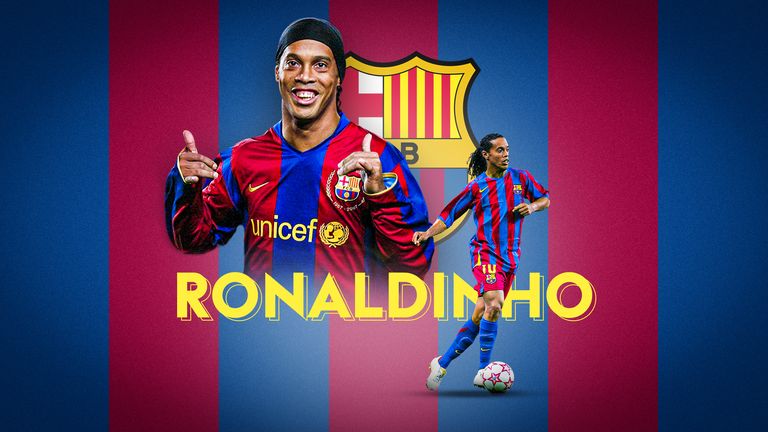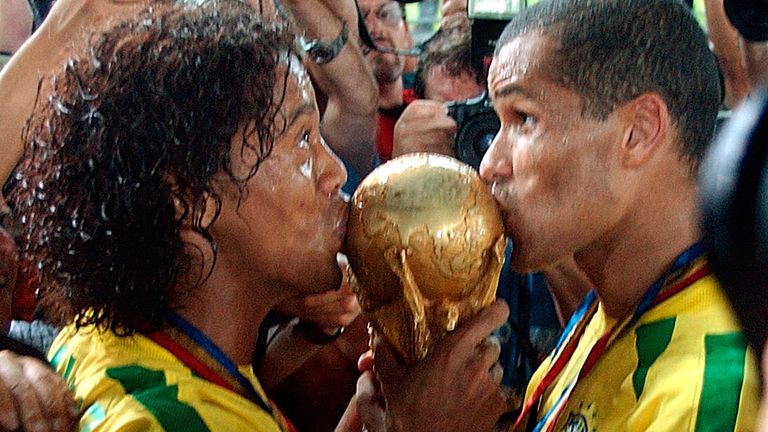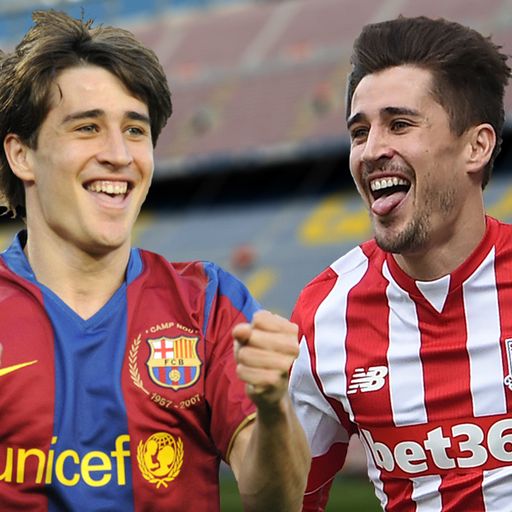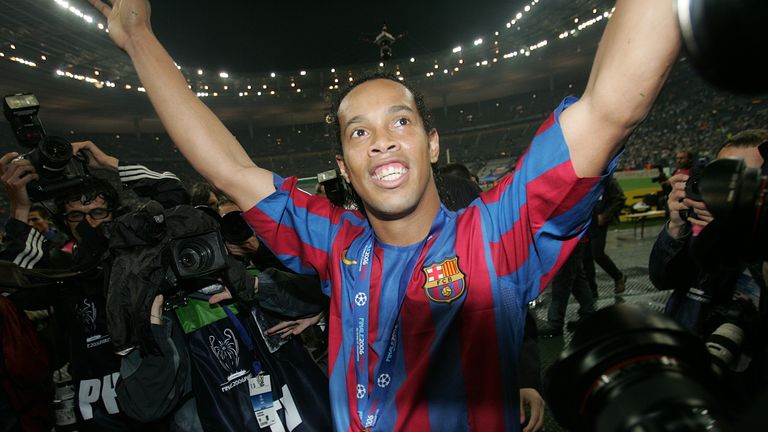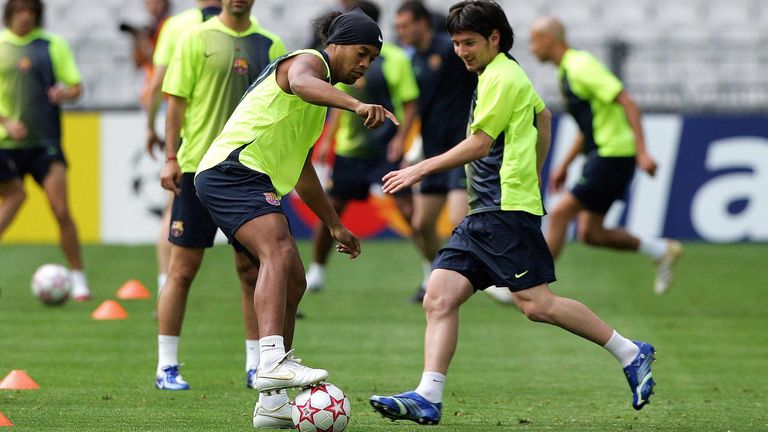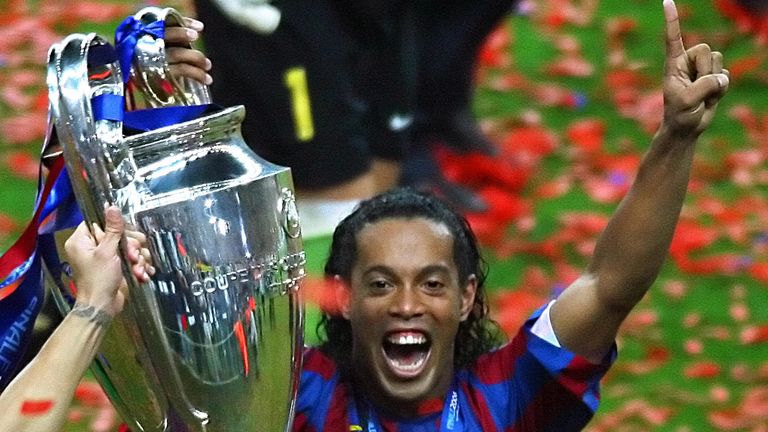Ronaldinho at 42: Assessing his greatness at Barcelona and those who say he was better than Lionel Messi
As Ronaldinho celebrates his 42nd birthday, we assess the career of the former Barcelona favourite and what defines greatness with exclusive insight from a former team-mate who says the Brazilian was even better than Lionel Messi....
Monday 28 March 2022 14:25, UK
Ronaldinho won a World Cup in 2002 at the age of 22. Eleven years later he helped Atletico Mineiro win the Copa Libertadores in front of 56,557 fans in his native Brazil.
Lionel Messi and Cristiano Ronaldo have since redefined what longevity means for football's greatest players. The feeling now is that Ronaldinho's time at the very top was relatively brief.
He scaled new heights at Barcelona upon joining in 2003 and the decline began soon after winning the Champions League in 2006.
But how do we define greatness?
Sustaining success matters. But it is possible that those acknowledged as the greatest to have ever played this game have never surpassed the sheer wonder of watching Ronaldinho at his peak, toying with teams just because he could. That spectacle has yet to be beaten.
Trending
- PL Predictions: Forest to turn up heat on stubborn Ange
- Transfer Centre LIVE! Bayern want Dortmund's English winger Gittens
- Liverpool latest: Slot says it's 'so hard' to win a league
- Man City latest - Pep: City chair supports me 'incredibly'
- Amorim: Man Utd are maybe in one of their lowest moments
- How does a 'different' Arsenal cope without Saka?
- Littler targets nine-dart history: 'It's becoming a frustration'
- Is this the man to dethrone Usyk? 'He would knock him out!'
- Kelce breaks record as Chiefs beat Steelers to clinch No 1 seed
- Tarkowski: Everton are confident of getting result at Man City
If that seems sentimental, it is a view still held by those who witnessed the conjuror supreme up close. Bojan Krkic played more than 100 games alongside Messi at Barcelona but he does not hesitate when asked who is the greatest that he has played with.
"For me, Ronaldinho is the best player that I have seen in my life," he tells Sky Sports.
"It was the way that he did it. When you watched Ronaldinho, you could think that it was not that difficult. But he was doing things that were really difficult to do.
"Only he could do them."
Ronaldinho was different. He popularised the no-look pass and seemed to have an extra dimension at his disposal when dribbling, lifting balls over opponents as well as past them.
Cesar Cruz once said that "art should comfort the disturbed and disturb the comfortable" and that was Ronaldinho.
When rolling his foot over the ball, he could lull and soothe. Barcelona team-mate Eidur Gudjohnsen once claimed that one day he would surely make a ball talk.
But he was also capable of that jolting injection of urgency that could shock, producing something that nobody in the stadium had anticipated.
Consider his extraordinary goal against Chelsea at Stamford Bridge, struck from a stationary position. It was the sort of moment that had people wondering why they had never seen it before, only to later come to realise that they have never seen it done since either.
That act of deceit brought a goal and an important one at that.
Other magic touches led to famous assists. Perhaps you will recall the ingenious scooped pass that set up Messi for his first-ever Barcelona goal against Albacete or the flick and dink combo to put the same player through to score against Deportivo.
Easier to miss are the moments that do not make the abridged highlights but are seared on the brains of those in the building. The dozens of disguised passes and nutmegs. That low, raking pass against Athletic that travelling little more than a yard off the ground at any point but still contrived to take out no fewer than nine opposition players.
Messi and Ronaldo reset the bar. Even Ronaldinho's best scoring season in Europe could not match anything that either man has produced in each of the past 13 seasons.
But the land Messi inherited was sculpted by Ronaldinho.
He changed Barcelona.
"Ronaldinho came in a difficult period," says Bojan. "Barcelona were not good as a team. Camp Nou was 50 per cent full. It was half empty. When Ronaldinho came, I remember his first day when he arrived in Barcelona with his smile, he had something special."
Messi himself says that Ronaldinho was the spark that lit everything. Real Madrid's Galactico project was vanquished. The 2006 Champions League win was the prelude to the greatest period in Barcelona's history. "With Ronaldinho, it all starts," adds Bojan.
"He was the one who started to bring that winning mentality to the club. As a player, he was so complete. He was doing everything that you could do as a footballer.
"I think many people went to Camp Nou because they wanted to see Ronaldinho. What he did for Barcelona in those two or three seasons was something magical, something unique."
That win in 2006 was a turning point. European competition had been dominated in the years immediately preceding that triumph by the containing game. Rafa Benitez at Valencia and Liverpool, Jose Mourinho at Porto and Chelsea, they had it locked down.
Ronaldinho held the key to unlocking it.
That already feels like another time in this era of high pressing. Athleticism has seldom seemed more important. Towards the end of his time in Europe, Ronaldinho became regarded as an indulgence, a luxury for fans to enjoy and modern coaches to endure.
The game has moved on but has it moved forward? Nobody has made it look as much fun since.
"Football is changing a lot, the world is changing a lot, people are changing a lot," adds Bojan.
"It is not as it was before. People do not follow it as a game now. There are many things involved with football. But we as players, we live in the same way as when we started running with the ball when we were four years old, with the same passion.
"Ronaldinho, his body expression, his face, it was so relaxing, he was so happy.
"For me, he was the best."

